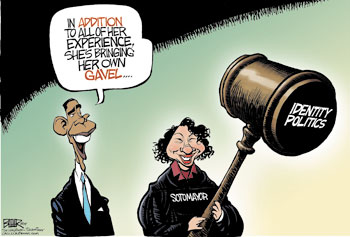
The story line is so appealing: the first African-American president appoints the first Latin American to the highest court in the land. Some have already disparaged it as an affirmative-action pick. The charge is as unfair now as it was 18 years ago, when President George H.W. Bush nominated Clarence Thomas. Sotomayor has ample intellect and experience to get where she is. She likely did not have to play either the gender or ethnic card.
But she may have been fortunate that she did not have those cards played against her, as did a group of New Haven firefighters, including one Hispanic firefighter, who were denied promotions because no African-Americans qualified for promotions when they took the same test. No black promotions meant no promotions. Period. End of story. The firefighters appealed, but to no avail. Their plea was dismissed when it reached the Second U.S. Circuit Court of Appeals in New York, where Judge Sotomayor sat as part of a three-judge panel. It was dismissed, as the world knows by now, without a written opinion. No need to explain to the firefighters or their attorneys, or indeed the rest of us peasants, why not promoting the firefighters who passed the test and not promoting those who failed the test equaled equal justice under the law. They — and we — probably wouldn’t understand.
But Sotomayor does understand, or at least hopes she understands. As she said in a 2001 speech: “I would hope that a wise Latina woman with the richness of her experiences would more often than not reach a better conclusion than a white male who hasn’t lived that life.” And, let’s face it, the firefighters case does have some semblance of logic. Those who passed the test and those who did not were “not promoted” equally. It brings to mind the late Sen. Roman Hruska’s observation of a few decades ago that the mediocre need some representation on the Supreme Court, since there are so many of us — of them. Whatever.
But never mind the affirmative action and forget for a moment Sotomayor’s foolish remark that a Latin-American woman will make better decisions than a white man. What is most revealing is something the nominee said that will no doubt be explained away as a joke or a frivolous remark. While taking part in a panel discussion at Duke University Law School in 2005, Judge Sotomayor explained the difference between ruling as a U.S. district and appeals court judge. “The court of appeals is where policy is made,” she said, despite the fact that the U.S. Constitution forbids courts to make “policy” (that’s the job of the legislature). That, at least, was refreshing candor.

But Sotomayor was a reluctant Cassandra. She immediately tried to explain away her admission and tripped over the theory of holes: when stuck in a hole, stop digging. “And I know this is on tape and I should never have said that,” she confessed in a mea culpa moment. Then she plowed ahead like Roy Riegels, gripping the ball securely as he ran the wrong way in the Rose Bowl.
“I know, I know. We don’t make law. I know. I know.” That brought a wave of laughter at Duke Law School, as it would at any other. Wisely or not, Sotomayor was making a joke. She knows, and everyone in that room knew, that judges make law. Her denial was undeniably pro forma. It was, “We don’t make law.” (Wink, wink, yuk, yuk.) We, the intelligentsia, know better. But be careful not to tell the peasants.
If there is any doubt, one need only listen to the explanation that followed. At the district court level, she explained, the rulings are not “precedential,” so they are based on law and facts, and “the facts control.” But in a court of appeals, rulings are handed down that establish precedents that both appellate and district courts are likely to follow in future judgments. And in making said rulings, one must look at where precedent has been and where it is headed. And the judge looks at what impact his or her ruling will have “on the next step in the development of the law.” (Emphasis added.) But “we don’t make law.” Yes, Judge Sotomayor. We know. We know.
Here we have a Supreme Court nominee confirming virtually everything conservatives, libertarians, and constitutionalists have been saying about judicial activism for the past half-century. Sotomayor has waved a red flag in front of Senate Republicans who have been condemning judicial activism in every election campaign and then voting to confirm every judicial activist nominated for the Supreme Court and lesser courts. Sotomayor waved the flag. Will the Republican elephant charge? Or will it do what it did for Clinton nominees Ginsburg, Breyer, and others — roll over and play dead?
There may, after all, be no point in breaking with precedent.



